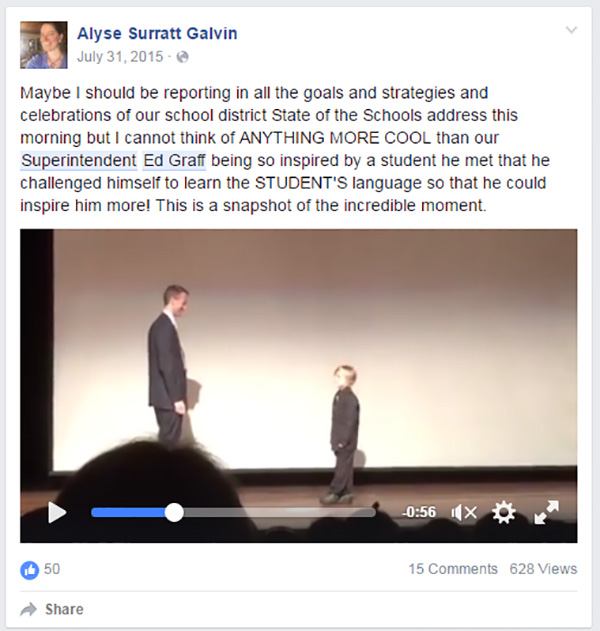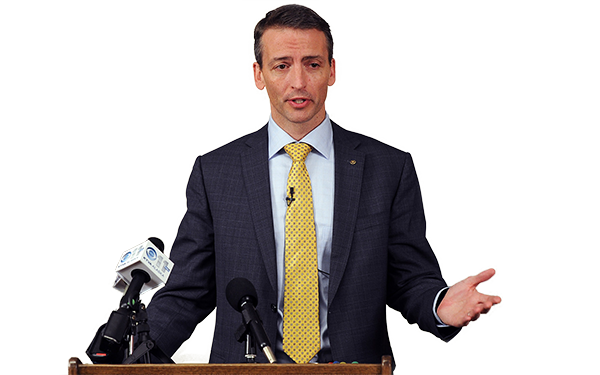UPDATE: Tuesday night, Minneapolis Board of Education members voted 6-3 to hire Ed Graff, the outgoing superintendent in Anchorage, Alaska, as the district's new schools chief. It was a move I somewhat foreshadowed in my blog post earlier this week and published below. During the 90-minute meeting that preceded the vote, board members said they were impressed with Graff’s candor and professionalism and think he has the potential to seed a more positive culture in the district. The two board members who traveled to Anchorage to perform a pre-vote site visit, Rebecca Gagnon and Jenny Arneson, reported that morale in the diverse district was high despite large staff layoffs necessitated by the low price of oil, Alaska’s main source of state revenues.
Lake Woebegone image notwithstanding, Minnesota schools feature some of the widest racial and ethnic achievement gaps in the nation. Children of color make up three-fourths of the nearly 36,000 students in Minneapolis, the state’s third-largest public school district. Disparities between white children, students of color and students with disabilities receiving the kinds of harsh discipline that frequently lead to a student’s dropping out are horrific. Not surprisingly, enrollment has declined sharply over the last decade as parents choose higher-performing charter schools or suburban districts.
Minneapolis Public Schools (MPS), which I have written about since the late 1990s, has been a hotbed as adults with conflicting beliefs wrestle for control of the district’s direction. In the 18 months since Superintendent Bernadeia Johnson resigned, school board members and their very vocal constituents have been unable to agree on a new leader, much less the strategy that person should pursue.
My most recent blog post is about a strange and hopeful 11th-hour twist in the saga.
(Minneapolis, Minnesota) The conspiracy du jour last week involving the Minneapolis Public Schools was this: A superintendent search committee Friday night advanced its two finalists for the job, Minnesota Commissioner of Education Brenda Cassellius and some guy from Alaska.
The dark horse, Ed Graff, is the outgoing superintendent in Anchorage. His contract was not renewed earlier this year because his board felt someone else was needed to drive aggressive academic growth.
To be sure, there were more candidates in the pool than just the presumed favorite, Cassellius, and the unexpected Graff, with at least two of those other contenders being well regarded and arguably qualified. A couple of days before the finalists were announced, three members of the Minneapolis Board of Education introduced a resolution to have three finalists put forward but were shot down.
Sounds like a setup, right? Surely Graff, as my colleague Chris Stewart immediately quipped on Twitter, was the equivalent of the team that always goes up against the Harlem Globetrotters — destined to lose while making Cassellius look good.
And there are various schools of Kremlinology that could explain why some folks, including factions of Minnesota’s dominant Democratic Farmer Labor Party, which typically anoints the school board, would want to structure things so that Cassellius was the obvious candidate. The commissioner’s track record in both Minneapolis and at the state level is mixed and she’s got enough critics that her appointment could otherwise be as uphill a fight as Merrick Garland’s.
Every step of the multiple searches that got us to this point has been radioactive. The selection of a new superintendent to replace Bernadeia Johnson who resigned in 2014 has served as one proxy skirmish after another for an ongoing battle for the direction the district should take. Some board members want to continue to push for strategies — such as giving principals the ability to recruit and keep the best teachers and sending more funding to the most impoverished schools — that in other places have made a dent in the huge disparities in outcomes for white children and children of color and disabilities. Others want to roll back some of those changes.
And — and this is important — the fractious and back-bitey tenor of the board’s two failed attempts to name a superintendent over the last 18 months have resulted in so much community mistrust that precious few of the advocates who’ve tracked the process are left in the room.
Seriously—last week African-American leader Bill English stood before the board and announced that he would no longer regularly monitor its meetings and would instead use his time to volunteer at Harrison Education Center, the Dickensian black box to which the district’s most challenged high school students are consigned.
Bill English has given up. That’s like looking up into the sky and realizing the Big Dipper has disappeared. Myself included, the hall monitors have all been wrung out.
And so it was that late Tuesday afternoon, I was halfheartedly listening to the finalist interviews with the full board on TV while I took care of some other things. And I was listening grudgingly, thinking, “Why am I doing this? I’m just going to end up angry.”
And then Graff, that guy from Alaska, started talking. A couple of minutes in I found myself looking around, trying to discern whether winged swine had taken to Minneapolis’ skies. A couple of minutes after that I found myself cursing the fact that after the months of sturm und drang there were probably so few people watching. There appeared to be fewer than a dozen people in the audience, which included the search coordinators, who had to be there.
Graff knocked it out of the park, in my opinion. You may or may not agree, but chances are Minneapolis residents weren’t watching Tuesday night no matter how committed to MPS’ outcomes they are. Indeed, the most committed among us probably decided to take a personal wellness break and create some distance. Thank the fortunes, then, MPS put up video and audio of the interviews.
Board members were respectful and constructive Tuesday discussing next steps. If their body language and questions are any clue, they appear to be weighing two viable choices. Machiavelli lurks ever-present in the shadows, but if there was ever a moment to check back in, this is it. It sounds as if they honestly want to hear what people think.
Here’s what I think. Graff’s presence was calm and relaxed. His answers to board member questions were direct but not without nuance. He was speaking an octave lower than any voice heard in that room in recent years, with the result that people were listening.
“I really believe addressing equity is the framework for addressing the achievement gap,” he said, going on to explain that the work of addressing equity must happen on two levels: The shift in people’s behavior and the implementation of technical changes. It’s crucial, he opined, to focus on the first.
Which is everything, right? If there is one thing that has persistently plagued MPS over the last decade, it’s the failure to create an institutional culture where everyone understands what equity means and truly embraces their role in creating it. The word equity gets thrown around like confetti, but the thousands of adults in the system insist on using it to support their pre-existing worldview.
Graff did not necessarily tell board members what they wanted to hear. For instance, he said he supports weighted student funding—the moral but politically dicey practice of ensuring more funds directly follow the challenged students they are intended to support—but knows from experience that there are real hazards to simply moving funding streams without carefully considering impacts.
This is 110 percent reasonable, yet cannot have been music to the ears of board members pro and con. Indeed, there has to be some discomfort at the thought that Graff is a veteran of the process.
He talked a lot about students, and he talked a lot about investing in teachers. “He understands the students in these schools are people’s kids,” another MPS mother following along from her couch texted me.
His remark that disparities in the discipline of special education students and children of color is the civil rights issue of our time had a teen with a disability in my house cheering.
And it’s my bad that I initially sneered at the idea that Anchorage doesn’t have the kinds of challenges Minneapolis confronts. The district enrolls almost 50,000 students from a variety of ethnicities and races. Hmong, the language of the Southeast Asian ethnic group of the same name, is one of the top five spoken after English.
“Alaska, which educates about 130,000 children in preschool through 12th grade, faces achievement gaps that rival or exceed those of the most troubled urban school systems in the Lower 48,” the Alaska Dispatch News reported in September. “Only 57 percent of Alaska Native students graduated on time in 2013, for example, compared to 78 percent of white students. Only 7 percent of Alaska Native fourth-graders are proficient in reading, according to the 2013 National Assessment of Educational Progress, compared to 41 percent of white Alaskans.
“But as teachers and principals work to close those gaps, they face budget problems caused by a dramatic drop in the price of oil, on which the state's coffers overwhelmingly depend. And they face perennially high teacher turnover, particularly in far-flung rural villages, that makes it difficult to build and sustain meaningful school improvements.”
Graff demurred on questions about the Anchorage board’s decision not to renew his contract, suggesting the queries should be directed at the board members in question. This could either mean he hopes to make it through the interview process without having to disclose a hot, steaming mess. Or it could mean he’s a grownup.
A little sleuthing on a database of Alaska news sites suggests understanding the answer probably requires an understanding of Anchorage’s context. There are scores of letters to the editor from people who were disappointed he was not renewed. And Alaskan commenters — including Graff’s erstwhile boss, who was superintendent from 2000-2012 — are peppering Minnesota blogs and Facebook pages with praise.

Here’s the kicker: The positivity is coming from folks who haven’t agreed on the color of the sky for a decade-plus.
Board members who last week traveled to Alaska in search of answers will report their findings. It’ll either go to Minnesota Commissioner of Education Brenda Cassellius, or some guy from Alaska.
Get stories like these delivered straight to your inbox. Sign up for The 74 Newsletter


;)
